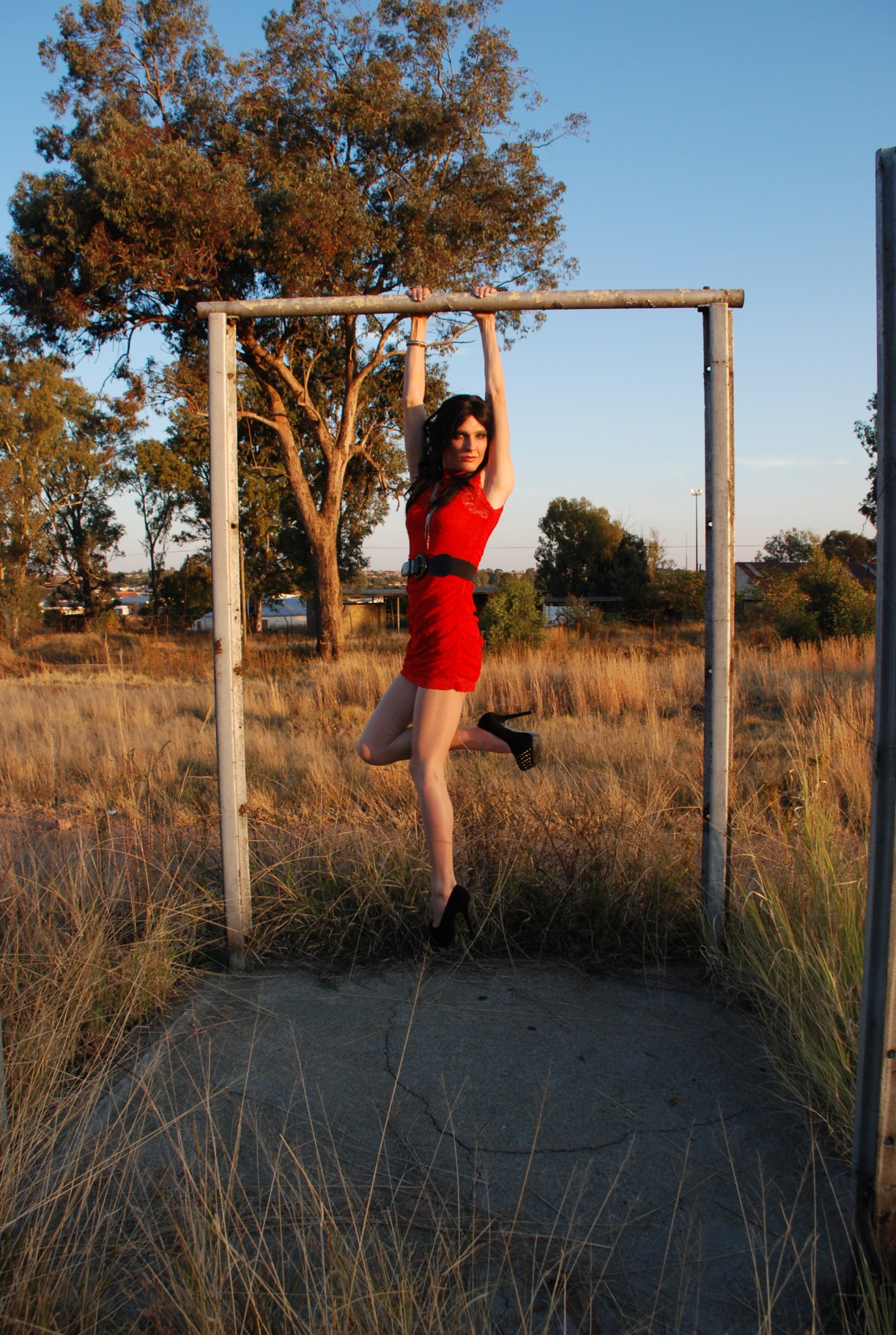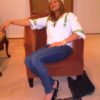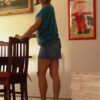In Conversation with Harper Lockheart
Harper is a South African drag performer and psychologist and has already had an interesting life and career although she is still young.
Daniella Argento (DA): What does being transgender mean to you and how would you define yourself?
Harper Lockheart (HL): For years I felt that transgender was an umbrella term that included both transsexual persons as well as those who identify as drag queens – whether it be in the form of gender illusionists, comedy drag, female impersonator or the various variety of queens we have in our community. I spent many years struggling with my own identity and where I fit into the wonderful rainbow that presents our community. During my many years as a drag artist and performer, I have had the opportunity to meet with ‘girls’ from all different spectrums of gender identity: cis females, trans females (pre-op and transitioned), drag artists and even just the lovable gay guys who refer to each other as girlfriends. I truly believe that gender and sexual orientation is fluid.
I prefer the term ‘gender-queer’, because I believe it encapsulates what a lot of boys and girls are feeling. Many of us move around on this spectrum of complete masculinity to complete femininity. I am not sure if there is a center-point, an extreme end or even a way of determining your percentage of gender. I also don’t know if that is at all necessary and that is why the term ‘gender queer’ feels so powerful and empowering. It takes this area of confusion and allows for the movement between these pre-identified genders.
For me, male and female is simply not enough. Gender X feels offensive and to call myself transgendered would me a misrepresentation of the trans community as well as the struggles they face. I used to identify solely as a gender illusionist and for many years my art was to try to create the perfect illusion of femininity. Getting older (and hopefully wiser) I am starting to realise that is a misrepresentation of myself as well. I am not female, but I am not male either. I have no desire to transition from my current body and believe that the biology fits with the psychology of who I am – I simply choose not to fall into hierarchal categories of what gender should be. Although my femininity as a gay guy if often viewed by a large portion of the gay community and the straight community as a weakness or a flaw – it is my true self. I am femme and I have a penis. That does not make me less male or less female. It makes me human.
DA: When and how did this first manifest?
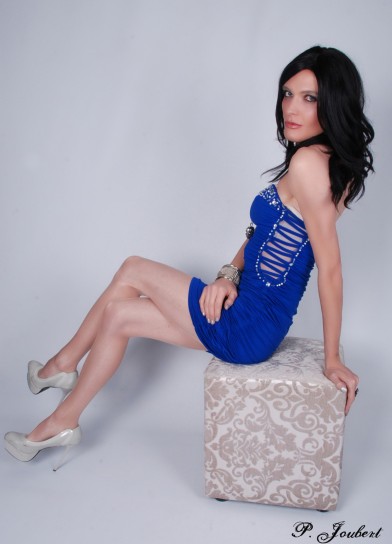
HL: Since a very young age I knew I preferred certain traditional female roles over that of male roles. Along with that realisation, also came the overwhelming feeling of responsibility to challenge these pre-identified roles and the perceptions of people who desperately cling to them as a way to prove their own sanity, christianity, comfort or as a way to belittle their own sense of gender fluidity. I know that comes off as being judgmental and I have always struggled with accepting that people with differing world views than mine are entitled to their ontological assumptions as well. I tend to get overly excited about broadening minds and changing perceptions, but the reality is that I first have to understand their view before I can try to make them understand mine.
Like I stated earlier, my own gender fluidity caused some struggles for me regarding my identity. I moved between identifying as transgender and drag many times before accepting myself as gender-fluid or ‘gender-queer’. This acceptance only came recently when I started accepting that apart from the pre-identified genders (male and female) that I resisted, there are also more than just ‘cis’ or ‘trans’ and I did not need to place myself into any category to be human. This is not a cop-out due to me not accepting myself, but rather an emancipation from preconceived identities that did not fit with my true self.
DA: What are the biggest challenges you face and how do these challenges relate to your identity?
HL: I work in a rather conservative, traditional environment where gender roles still play a vital role in every day work activities. Along with my childhood dislike of these gender roles, I always believed that my current working environment would be the last place I would end up, but I think that the universe intended for me to be here exactly because of that. I am a research psychologist for a conservative government institution.
Within the organisation we have strict rules according to our pre-identified gender regarding how to dress, wear your hair, jewelry regulations and even restroom behaviour. My biggest struggle regarding these rules where having to fit in with the preconceived image of what a man should look like. I had to cut my hair, stop wearing nail polish and eyeliner and of course start wearing the ‘male uniform’. None of these fitted in with my gender identity. I remember wearing nail polish on my toes for the first six months just to still feel like the true me underneath all the forced masculinity.
Another big struggle relates to certain constitutional rights that we sign away upon signing our contracts. The biggest one for me is the right to privacy. I love my job and I have gotten used to the environment and even thrive in certain situations, but when it comes to the lack of privacy I want to squeal and disappear. As stated earlier we have certain gender roles and one of those is to fit in with your biological gender and use the restrooms equipped for your specific biological tools. These restrooms offer an astounding lack of privacy and on courses you have the gender role of having to fit in and be naked together. I mean, come on you are all men after all. You all have a penis. If only gender and life were that simple.
Firstly, being a person who is attracted to men, the last place I want to be is a communal shower filled with a bunch of naked men – contrary to the image the porn industry has created. I don’t want to constantly control my biological reactions to other naked men or have the potential ridicule due to possible biological reaction. Nobody wants to have an erection in the male locker room. On the occasions where this has happened, I jokingly told the guys who noticed that they at least have a place to hang their towels now. Secondly, my feminine build (being slender, having less muscle mass, finer features and well taken care of skin) and feminine personality attributes causes quite an attraction in these locker room settings. Some men would actively try to avoid being naked around me (what if the gay guy checks out my junk), some would actively parade their junk in front of me to see my reaction and others would just awkwardly stare at me for looking different from what a traditional pre-identified male looks like. This leads to a lot of very early morning showers when most of the other ‘guys’ are still asleep and I have some measure of privacy. In some instances this can not be achieved (regulated shower times) and then I try my best to dissociate from the situation (as a psychologist we have our tricks) and survive it.
Apart from these struggles (which I know pale in comparison to what other people experience), I have so far had a very blessed and safe life. Every once in a while there will be the rude remarks or occasionally physical intimidation, but I have had it easy. I have had the privilege of leading pride marches, of being a voice for LGBTIQ persons in my immediate community, of being protected by friends, of living an authentic life and of being able to make a small difference in the lives of others.
I am thankful for my opportunities and I regard the difficult times as moments of growth and learning.
I serve as an openly gay man within the government setting and have had little difficulties apart from the privacy issues. I have felt acceptance in my workplace and have been able to assist other persons through my work here. My family is remarkably more open to the ‘gender-queer’ identity than that of a gay man – simply because of how I have always lived my true self. They don’t accept me as gay, but have always accepted me as gender-fluid they have always known their boy has a little (okay huge) bit of girl in him.
My friends are angels who accept me for who I am and although many of them don’t necessarily understand what ‘gender-queer’ means, they are willing to listen and learn.
DA: What are your biggest fears and hopes for the LGBTIQ community?
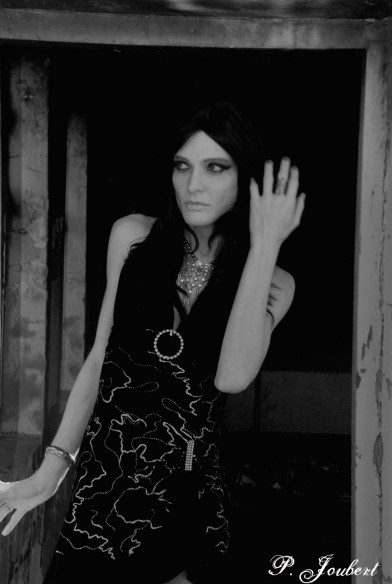
HL: I fear for the LGBTIQ community in general. I think we are at a crossroads within our own community. We already have challenges as gay guys, lesbian girls and transgendered persons with the non-accepting part of the larger communities and living in a country where the president openly admits to his own homophobia. We have overcome many of these challenges and we will continue to do so. The fears I have relates to how we perceive and accept each other. Dating sites are full of descriptions like: ‘no fats or fems please’ or ‘only feminine lesbians’ or ‘no trannies’ or ‘looking for she-males and crossdressers’. These are not only demeaning, but echoes our communities own struggles with acceptance – of themselves and any person that seems different from them. I know when it comes to dating we all have preferences and I am not trying to place judgement on any person for dating who they want. I am stating that these descriptions are a symptom of our own bigoted self-acceptance. We, as a community struggle for acceptance from our families, colleagues, friends, strangers and ourselves. Yet, we easily place ourselves in a position of power over other members of the community. I have seen so much hate toward drag queens, so much disdain for effeminate gay guys, so much disrespect for ‘butch’ lesbian girls and so much misconceptions regarding transgendered persons. I have also seen so much love and acceptance of all persons. My biggest fears for our community is what forms my biggest hopes as well.
I envision a world where labels are only attached to clothing or food brands, where love and acceptance trumps ignorance and fear, where hands join together despite differences to pick up shattered dreams and offer comfort, where male and female become obsolete and people understand the fluidity of being human, where our rainbow beams and can truly be seen as a symbol of victory over preconceived bigotry.
DA: You have a fantastic look (anyone disputing this needs to take a look at some of the pictures below) and is a real beauty, please share some of your secrets with us.
As a drag queen I tend to dress a little more provocatively. My legs just look better in a mini skirt than in male shorts. I try to maintain a glamorous, young look by playing with colours and different styles, but my go-to-outfit will probably always be a short cocktail dress with way too high a pair of heels.
I take ages to get ready as both a boy or a drag artist. Make-up takes forever and I employ quite a few layers of contouring to get the look I want to achieve. I am blessed levitra india with naturally finer facial features, so I often get away with less make-up, but I literally put base all over my body (at least the parts visible and not covered by a dress). Even my legs get a good cover of base and powder before sliding them into a pair of stockings. I prefer sticking to a make-up style that works for me and won’t experiment as much with make-up as with clothing. I tend to stick to a smokey eye (either in grey tones or golden tones) with winged eyeliner. I always prefer a light pink blush with hints of gold or silver and my lips are usually red. The parts of my face I contour includes my squarish jawline and my extremely oversized forehead (apparently a sign of royal descent or intelligence – probably why I ended up being a queen).
Boobs: I prefer going for a natural look (creating a more real illusion) by sticking to a B-cup Because of my natural slender body, anything bigger would look too dramatic or fake. My dresses are never revealing on top, so I don’t contour cleavage that often.
As a boy, I don’t wear make-up anymore, but my hair takes ages. Doing drag makes hair easy – I slap on a wig or recently while rocking my own shorter hair, I get a friend to style it. As a boy, I have to find my own way of styling my hair on a daily basis to still look fashionable and in line with work regulations.
I got most of my make-up tips from watching my favorite celebrities doing their own make-up before hitting the stage, specifically Celine Dion. We both have longer faces and I tend to follow her contouring style. I have also had a lot of tricks taught to me by some of my drag sisters and even drag daughters over the years. The smokey eye is a signature look of my drag sister, Shaida, and she has helped me perfect the look for my own face.
Heels: never lower than 12 cm and I prefer a closed shoe over a sandal type stiletto. I also wear stockings most of time, so I prefer to stay away from peep-toe shoes. You will never find me wearing wedges or kitten heels. I used to kill my own feet during parades in my heels and even destroyed a couple of shoes over the years due to shows and parades. I have since learned the value of having a pair of flats in your handbag for those 5km walks.
My advice for girls who want to look fabulous would be to have fun. While you are still young and energetic you have the opportunity to play around with and explore many different looks. Don’t settle on one final look too soon. When you find one that works for you, make that your general look, but don’t be afraid to play around for themed parties, shows etc. And never be afraid to wear what you want. Screw preconceived ideas of dressing for your body type. It is your body – if you want to show it, then show it.
DA: Shopping is a major part of any transwomen’s life. It is a lot of fun but can be fraught with a lot of stress. How and where do you shop, tell us a little about it.
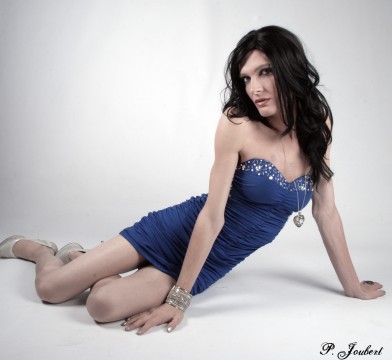
HL: With regards to where I get my outfits – I usually go to retail stores like Legit (they have gorgeous cocktail dresses) and Foschini (I have never found pencil skirts that fit better anywhere else). Also look at some of the more affordable stores like Mr Price and Jet. You can find some real gems there. I am blessed with being able to fit into most size 6/8 dresses in stores and wear a size 7 shoe, so my heels I tend to buy from Rage or Solo. Again, for a cheaper option, Mr Price have some great stilettos. Also check out China Mall or any of those smaller individually owned clothing stores. You find great dresses and shoes that are affordable and unique. Especially if you are doing shows and need a lot of outfits at an affordable price. They are not always durable, but are easily replaceable. I have had some outfits made by designer friends in the past and have even indulged in buying directly off the runway when I see something I just have to have. These are rare occasions though.
I have never had any real issues when shopping for female attire. Some of the bigger retail stores have issues with a man trying on female clothing, but then I use their buy and return policy and go fit at home. The smaller individually owned stores have never given me any grief about trying on outfits or shoes in their stores. Mostly they all just want to take a picture with me and the girls want lessons in walking with heels. I have had mostly wonderful experiences.
Even shopping for wigs turns into a little talk show where it is all about me and drag and there is always a captive audience listening to my tales about live in drag. I have a personal hairstylist who takes care of all my wigs and ensure that they look as fabulous as the day I bought them. PS Montana Traders in Pretoria has a wonderful wig store.
With make-up you have to spend some money. I would recommend that you always buy a trusted base and powder combination (they are expensive, but kinder to your skin). With lipstick, eyeliner etc you can get away with cheapies, but base is something you can never compromise on. You only get one skin and we have to treat it kind if we want it to treat us kind as well.
DA: Many trans people are terrified of losing their jobs if they are ever ‘outed’. It seems we all fear discrimination. Please tell us something about your experiences in your professional life.
HL: I am not sure that I have had a negative experience in this regard and am not sure if my own story will be of help for other members of the community. I have had plenty of job interviews before my current job and have had struggles with finding employment. I believe that it had more to do with transformation and economic empowerment than with my identification as gender-queer. I had the privilege of being able to study. My dad offered to pay for my studies as long as I agreed to pay for the rest myself. I found a job as a waiter and maintained it throughout my years of study in order to be able to pay for the extra expenses of being a student that doesn’t get calculated into study fees. In my particular field of study there are several selection processes before getting to the point of being an actual registered psychologist.
You have to complete a three-year degree, an honours degree and a master’s degree before you can apply with the Health Professions Counsel of South Africa to write the board exam that will enable you to register as a psychologist. I completed all my studies at the North West University which have had a lot of controversy in the past regarding LGBTIQ rights and even racism. I was the chairperson of a human rights group on campus and through the years there have been many wonderful changes at the university and equality has gained a lot of ground.
After my degree, I didn’t get selected for honours and there was a lot of speculation back then that the reason for this was due to my sexual orientation and gender-fluid appearance. There has never been any proof of this and I chose not to pursue any action against the University. I rather regrouped and applied again a year later and got selected. I doubt that their opinion regarding my sexual orientation and image would have changed in a short year and this strengthens my opinion that my first attempt and failure at selection had more to do with my academic skill than my sexual orientation or appearance. I didn’t get selected for the masters programme in clinical psychology at my first attempt either and now, years later, that was more of a blessing than a struggle. I opted for an internship in community mental health counselling and that was how I ended up at my current job. After 4 years of working, I enrolled for the masters programme in research psychology and with their support I completed my internship successfully and I am now registered as a research psychologist and practice as such.
DA: That is very interesting, a real tale of perseverance and inner strength leading to success. What are your future plans and dreams?
HL: Having had the privilege of a degree and a full-time job, I feel rather lucky and blessed. Not many persons have had my opportunities and although it took hard work and many sacrifices, I am still one of the very privileged few in our country.
My own experiences with psychology, my identity and the work life and challenges had led me to a very specific goal/dream in my professional career, but also as an activist and someone who believes in equality for all. I am currently busy writing a proposal for a research study to focus specifically on the experiences of transgendered (including gender-queer and gender-non conforming individuals) people in shared living spaces. On an activism level I want this study to inform policies that will protect transgendered people and promote an environment of understanding and acceptance for such individuals. On a professional level I want to establish myself as an expert researcher in the field of trans issues and would like this study to become my PhD. It will be a lot of work and will definitely not be a reality in the immediate future, but the process has been started and if all the hurdles can be successfully overcome, I hope the finalise the project within the next 5 years.
I have recently decided to bow out of performing professionally as a drag artist in order to spend my energy and time on this very important issue and to focus on my academic and professional career in psychology first. I will however continue to do drag and to improve my art – just not on stage anymore.
DA: That sounds very worthy and important. I wish you all the best of luck in that regard. Please can you expand a little in terms of how you like to be addressed?
HL: In drag you all know me as Harper Lockheart, one of the Paper Dolls. My boy name is Cobi Hayes. I have created separate accounts on most social media for my two different versions. Initially it was because I didn’t want the two to be associated with each other due to professional reasons. I have since realised that this was bigotry on my behalf – how can I expect to preach self-acceptance if I fear that my drag image would reflect negatively on my professional career as Cobi? My social media has taken on a life of its own however and integrating them would be torture. I now rather enjoy having two pages and don’t mind sharing them and incorporating them with regards to social events etc. I even have my work colleagues on my Harper pages now as well. For my professional career I will still have the Cobi pages with more info relating to my experiences and things relating to psychology and my personal life. The Harper pages are now purely for work as Harper within the community on for information regarding shows. I believe that these pages will be a lot more quiet with my recent break from performing.
So, when addressing me, as boy or drag artist – call me on the name you know. I am both Harper and Cobi.

